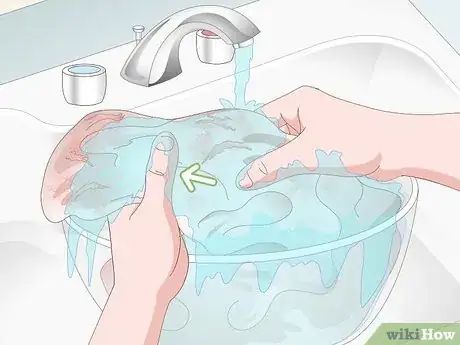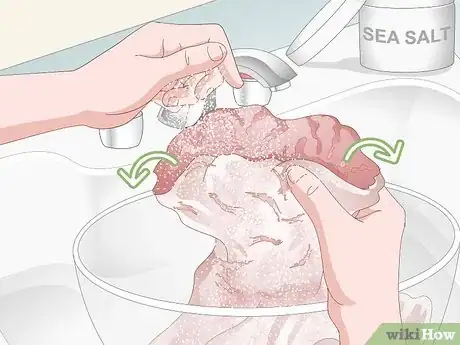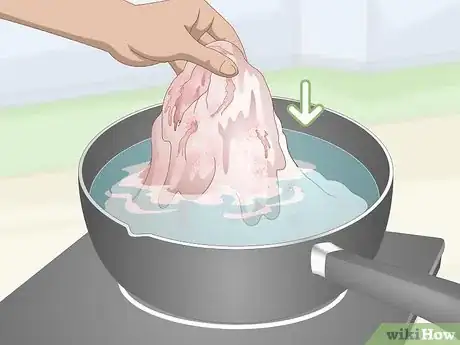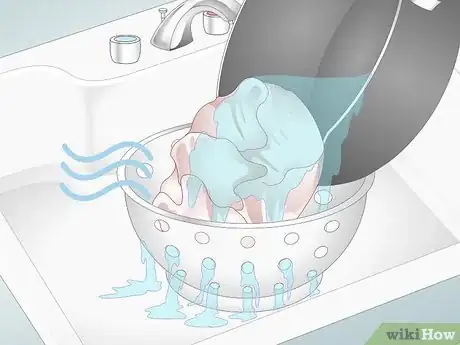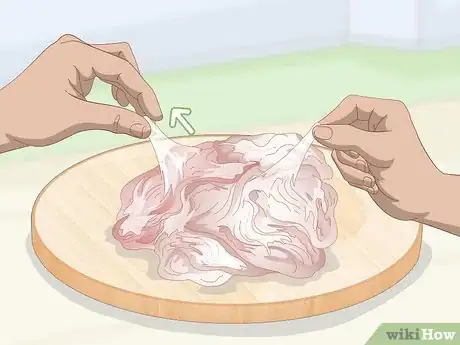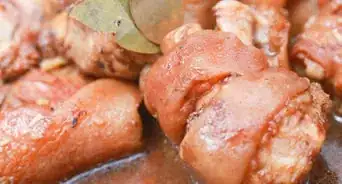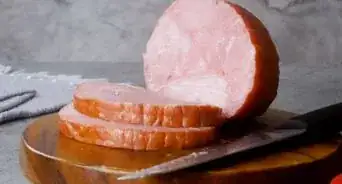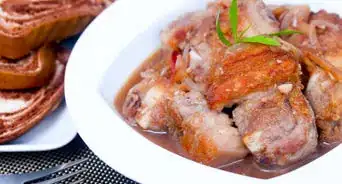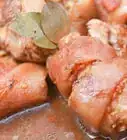This article was co-authored by wikiHow Staff. Our trained team of editors and researchers validate articles for accuracy and comprehensiveness. wikiHow's Content Management Team carefully monitors the work from our editorial staff to ensure that each article is backed by trusted research and meets our high quality standards.
There are 8 references cited in this article, which can be found at the bottom of the page.
This article has been viewed 26,039 times.
Learn more...
Hog maws are the exterior lining of a pig’s stomach and are a part of the cuisine of many cultures, such as the Pennsylvania Dutch and African-American soul food. In order to cook hog maws, you have to properly clean them first. Fortunately, cleaning hog maws is actually pretty easy. You can use salt as an abrasive to help you scrub them clean, or you can boil them to make it easier to clean them.
Steps
Washing with Salt
-
1Rinse the hog maws under running water. Take the hog maws out of their packaging and place them in a bowl under running water. Drain the water 2-3 times to rinse off any loose particles from the hog maws. Pull off any large knots of white fat that you see and throw them away.[1]
- Use cold or cool water so you don’t partially cook the hog maws and change their texture.
- Drain the water from the bowl periodically to keep it fresh.
-
2Knead the hog maws with your hands to remove debris. Under running water, use your hands to wash the hog maws and remove any discolored particles or debris that may be attached to the lining. Drain the water from the bowl periodically so the water stays fresh and the debris is washed away.[2]
Warning: Wash your hands thoroughly after handling hog maws to avoid contaminating anything. The bacteria contained in them can cause serious illness.
Advertisement -
3Add sea salt to help scrub the hog maws. Drain the water from the bowl and sprinkle sea salt all over the hog maw to act as an abrasive. Scrub the hog maws with your hands to further remove debris from them.[3]
- Pull off any rubbery, white lining from the hog maws.
-
4Fill the bowl back up with water and continue to scrub the hog maws. After you’ve added the salt and kneaded the hog maws to help scrub off debris and discolored particles from the lining, fill the bowl with water. Keep working the hog maws with your hands to break loose any stubborn particles.[4]
- Continue to drain the bowl to keep it filled with fresh running water.
-
5Turn the hog maws inside out and add more salt. Once you’ve removed the large particles from the outside of the hog maws, drain the water from the bowl. Turn the hog maws inside out and sprinkle salt all over the inside of them.[5]
-
6Use your fingers to brush off debris from the inside of the hog maws. With the salt acting as an abrasive, work the inside of the hog maws with your fingers to scrub them clean of any particles attached to them. Pull off any fat or lining that you see on the inside of the hog maws.[6]
- Fill the bowl with water and work the hog maws some more to remove debris.
-
7Scrub and rinse the hog maws until the water is almost clear. Keep filling and draining the water from the bowl as you clean the debris from the hog maws. Make sure that all of the salt has been rinsed off of the outside and the inside of the hog maws.[7]
- There shouldn’t be any more of the white, fatty lining on the hog maw.
- The hog maws can then be cooked or stuffed.
Boiling Hog Maws
-
1Place the hog maws in a pot of water and bring it to a boil. Remove the hog maws from their packaging and place it in a large pot. Fill the pot with enough water to cover the hog maws and bring the water to a boil over high heat.[8]
Tip: Add a sprinkle of salt to the water to bring it to a boil quicker.
-
2Simmer the hog maws for 30 mins over medium heat. Once the water starts to boil, turn the heat down and let the hog maws simmer for 30 minutes. Stir the pot occasionally to make sure none of the hog maws stick to the sides.[9]
- Hog maws can produce a strong odor when they’re boiled, so consider opening a window or turning on an oven vent to remove the smell.
-
3Drain the hog maws and let them cool. After they’ve boiled for 30 minutes, drain the hog maws in a colander and allow them to cool for at least 10 minutes. You will be using your hands to remove large particles so they need to cool enough for you to handle them.[10]
-
4Use your fingers to remove fat and debris from the hog maws. Look for white lining, knots of fat, and any discolored particles on the hog maw. Use your fingers to pull and peel them off. Throw away anything that you pull off of the hog maws.[11]
- Look for any pieces that have an orange color and remove them as well.
-
5Cut the hog maws into 1⁄2 inch (1.3 cm) strips. Boiling the hog maws changes the texture of them and makes them unsuitable for stuffing. Use a knife or a pair of kitchen scissors and cut them into small strips so you can add them to your dishes.[12]
Things You’ll Need
Washing with Salt
- Large bowl
- Sea salt
Boiling Hog Maws
- Large boiling pot
- Colander
- Kitchen knife or kitchen scissors
Warnings
- The bacteria contained in raw hog maws can cause serious illness, especially in children. Make sure you wash your hands thoroughly anytime you handle hog maws.⧼thumbs_response⧽
References
- ↑ https://www.allrecipes.com/recipe/89191/hog-maw/
- ↑ https://youtu.be/rH534FOaF4I?t=34
- ↑ https://youtu.be/rH534FOaF4I?t=59
- ↑ https://youtu.be/rH534FOaF4I?t=59
- ↑ https://youtu.be/rH534FOaF4I?t=97
- ↑ https://youtu.be/rH534FOaF4I?t=97
- ↑ https://youtu.be/rH534FOaF4I?t=97
- ↑ https://youtu.be/NCTgjTdx82w?t=32
- ↑ https://youtu.be/NCTgjTdx82w?t=156

